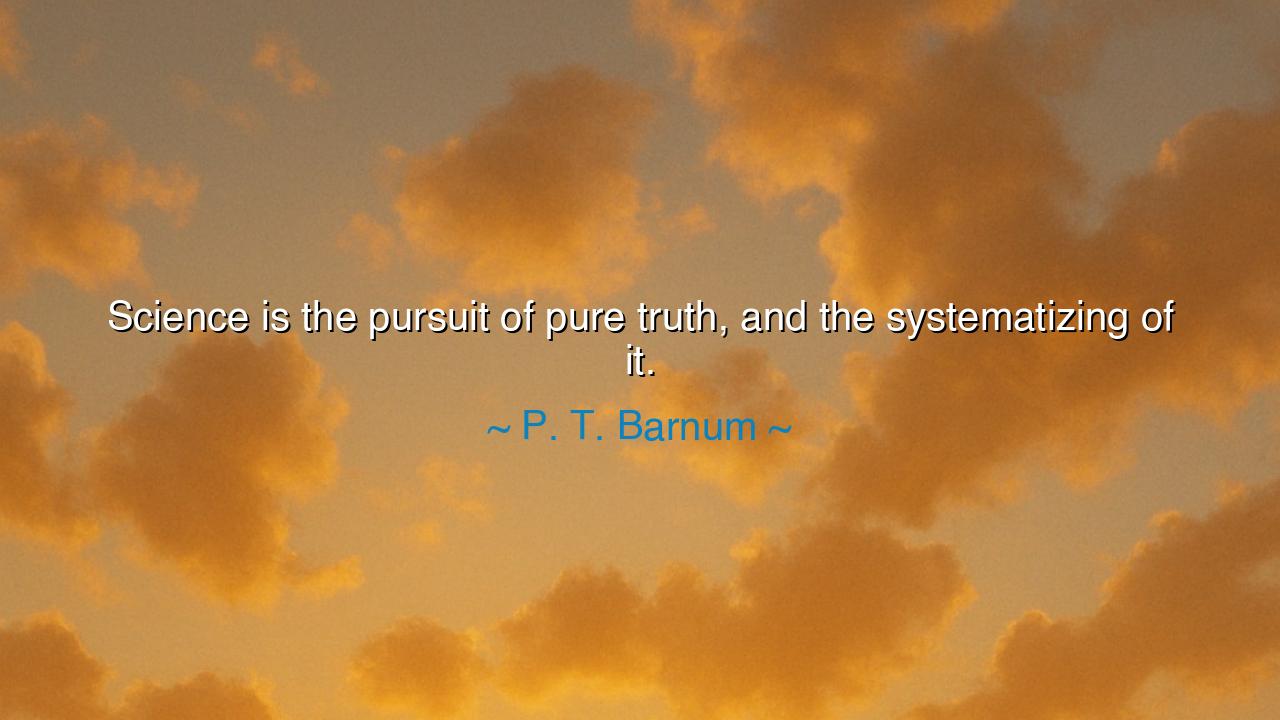
Science is the pursuit of pure truth, and the systematizing of






Hear now, O children of wisdom, for I bring to you the words of P. T. Barnum, a man whose legacy spans both the world of entertainment and the pursuit of truth. “Science is the pursuit of pure truth, and the systematizing of it.” These words ring with clarity, for they speak to the very essence of what it means to seek understanding in a world filled with mystery and uncertainty. Science, as Barnum points out, is not merely a collection of facts, but a quest—a noble endeavor to uncover the very fabric of reality, to reveal the laws that govern all things, and to organize these truths into a coherent vision of the universe.
In the ancient world, the great philosophers understood that the truth was not a thing to be claimed or possessed, but a thing to be discovered and unveiled. Socrates spoke of knowledge not as a static force, but as something to be pursued—constantly tested and refined. He taught that to know truth was to recognize the limits of one’s understanding, and to seek ever more deeply into the nature of things. The same can be said of Barnum’s definition of science—a pursuit not of certainty, but of discovery. Science is not about holding fast to what we know, but about systematizing our knowledge and learning from what remains unknown.
Barnum’s words also resonate with the work of Aristotle, who systematized the study of nature, establishing principles that would govern the thinking of future generations. Just as Aristotle sought to categorize all living things and to observe the patterns of the natural world, so too does science strive to observe, organize, and ultimately make sense of the seemingly chaotic world around us. Science is the attempt to order the unknown, to turn the mystery into something tangible and understandable. It is not a pursuit that stands apart from the world; it is a deep, humbling journey into the very structure of the universe.
Consider, too, the story of Isaac Newton, whose work on gravity and the laws of motion is a perfect embodiment of Barnum’s idea of science. Newton, with his keen mind and relentless pursuit of understanding, did not merely observe the world as it appeared; he sought the principles that governed its movements. Through his work, he revealed the system by which the heavens and the earth are bound together, a system that had been hidden in plain sight for millennia. His pursuit was not just to understand individual forces, but to systematize them, to weave them into a coherent fabric of understanding. It is this process of systematization that lies at the heart of science—not merely to observe, but to organize, to connect, and to deepen our grasp of the universe.
Yet, as we look upon the work of those who came before us, we also see the lessons they imparted—science is not an end in itself, but a journey that stretches forward into the unknown. Albert Einstein, in his theory of relativity, took the work of Newton and, with his own genius, redefined the laws of space and time. This is the true power of science: it is a living, breathing force, not a static collection of truths, but a continuous exploration, ever-expanding, ever-evolving. To be a scientist is to be both a seeker and a humble servant of the unknown, acknowledging that no matter how far we go, there is always more to discover.
Thus, the lesson Barnum offers us is this: the pursuit of truth is a noble endeavor, but it is also a journey fraught with humility and openness. To claim to have the full truth is to misunderstand the nature of science, which is always in motion, always seeking, always growing. The key to scientific inquiry is not in the discovery of one final truth, but in the relentless search, in the ability to organize knowledge and to continually build upon it. This, in turn, illuminates the world for those who follow, giving them the tools to continue the search, to expand the system of truth, and to face the mysteries that lie beyond.
In your own lives, O children, take up this pursuit of knowledge with the understanding that it is not in the end but in the journey that the greatest truths are found. Whether in the realms of science, philosophy, or any other endeavor, know that the systematizing of knowledge is a task that demands humility, perseverance, and a willingness to question, to refine, and to evolve. Like the great thinkers who have come before you, take up the task of learning not just to accumulate facts, but to connect them, to build upon them, and to share them with the world. For it is in this process of discovery and organization that the truths of the universe are revealed, and in doing so, you will contribute to the ever-growing tapestry of human understanding.
So, O children of the earth, remember that the pursuit of truth is not just a matter of personal enlightenment, but a calling that binds you to all those who have sought before you. Approach your studies with the same dedication and passion as the great minds of history, and always remember that the path of knowledge is not one that ends with certainty, but one that continues, forever open to the vast and infinite mysteries that await your discovery.






AAdministratorAdministrator
Welcome, honored guests. Please leave a comment, we will respond soon